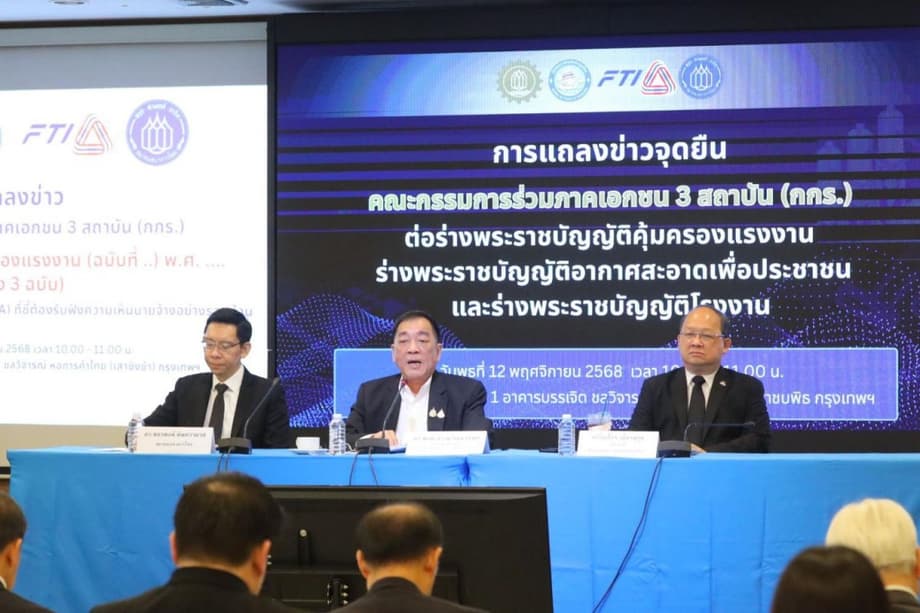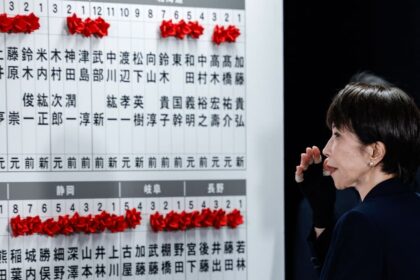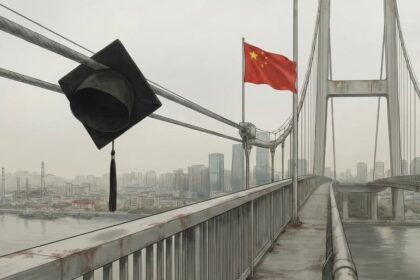A fragile recovery meets a regulatory push
Thailand’s most influential private sector alliance is urging lawmakers to rethink a set of draft laws on labour, clean air, and factory operations. The Joint Standing Committee on Commerce, Industry and Banking, which unites the Thai Chamber of Commerce, the Federation of Thai Industries, and the Thai Bankers’ Association, warns that the proposals could raise costs for employers, dampen investment, and weigh on a recovery that remains uneven. Two of the bills have cleared initial approval in the House of Representatives, while another is still awaiting review. Business leaders want a full regulatory impact assessment before any final vote.
- A fragile recovery meets a regulatory push
- What is in the three draft bills?
- Why business groups say costs would rise
- Clean air, PM2.5, and the penalty debate
- Factory licensing and inspections: ease of doing business at stake
- Labour rules, wages, and working hours
- Investor confidence and Thailand’s competitiveness
- A wave of rules beyond industry: alcohol law and business worries
- What happens next
- Key Points
The Clean Air Act is designed to curb toxic haze and PM2.5 fine dust, a recurring public health issue across northern and industrial regions. Industry groups say the draft risks overlapping with current rules, including the 1992 law on environmental quality, the 1992 Factory Act, and measures already used by agencies that oversee air quality. They are especially alarmed by penalties that could send a manager to jail for up to two years or trigger fines as high as 50 million baht even in cases of negligence. Some also argue the criminal provisions may not align with Article 77 of the constitution, which encourages careful analysis and proportionate sanctions.
Concerns extend beyond environmental compliance. The factory bill would tighten inspections and bring back time limited operating licenses, a step that businesses fear would reintroduce queues, paperwork, and uncertainty after years of attempts to streamline permits. Proposed labour law changes, including an annual minimum wage increase and shorter working hours, are another flashpoint. The private sector says pay and working time should move with economic conditions, employer capacity, and living costs rather than a rigid calendar. The committee maintains that Thailand’s competitiveness and investor confidence depend on predictable, coherent rules and effective enforcement of existing laws.
What is in the three draft bills?
The package spans environmental standards, factory oversight, and labour protections. Each seeks to raise standards for health, safety, and worker welfare. Business groups accept those goals but argue that the texts need clearer design, better coordination with existing laws, and more realistic timelines.
The Clean Air Act
The draft would put new limits on emissions and introduce economic tools to change behavior. Industry representatives say many of these tools already exist in different forms, including excise taxes on fuel and payments into the Oil Fuel Fund. They caution that stacking new charges on top of old ones could lift energy and logistics costs. Some business leaders advocate reducing Oil Fuel Fund contributions during a fragile recovery to keep fuel affordable while upgrading pollution controls through targeted incentives.
The factory bill
Tighter inspections and a return to time limited licensing sit at the core of the proposed factory rules. Industry argues that bringing back expiry dates would add delays for renewals and deter entrants, especially smaller manufacturers that struggle with paperwork. Business groups prefer risk based inspections, digital filings, and tougher enforcement against proven bad actors instead of blanket requirements that hit compliant firms.
Labour protection proposals
Private sector leaders have pushed back against labour amendments discussed in recent months, including reducing the standard week from 48 to 40 hours and expanding leave. Employers, especially small and medium sized enterprises, say these changes would push up costs, reduce production hours, and potentially cut take home pay for workers paid by the hour unless overtime rises. The business community also questions an automatic annual increase in the minimum wage, arguing that wages should reflect productivity, local conditions, and the ability to pay. This camp supports stronger protections for dignity, proper rest, and leave, but wants flexibility in how benefits are structured.
Why business groups say costs would rise
Compliance with tighter standards has a price. Clean air rules often require monitoring equipment, updated machinery, or cleaner fuels. The factory bill could bring administrative deadlines and possible downtime when licenses lapse or inspections intensify. Labour changes can raise wage bills and complicate scheduling for sectors that run round the clock. Large exporters might absorb costs with scale or technology, while smaller suppliers could face a squeeze. When supply chains pass on costs, prices up the line can climb or margins shrink, especially in low margin industries.
Private sector leaders want a regulatory impact assessment before final votes. This is a cost benefit test that models how a policy performs under different scenarios. A robust assessment weighs public health gains, environmental benefits, and worker welfare against compliance costs, productivity changes, and tax receipts. It can help lawmakers decide whether to phase in rules, set grace periods, or provide support for upgrades such as tax credits, technical assistance, and concessional loans for cleaner equipment.
Clean air, PM2.5, and the penalty debate
Thailand confronts a serious air quality challenge each dry season, with PM2.5 particles surging during crop burning and still weather. Industrial emissions, diesel fleets, and cross border haze add to the problem. Doctors and environmental scientists link PM2.5 to higher risks of heart and lung disease, missed workdays, and pressure on hospitals. Stronger enforcement of emission standards is a public health priority.
The dispute centers on how to calibrate penalties. Executives argue the draft’s heavy sanctions do not distinguish enough between deliberate violations and honest mistakes. They warn that a fine set at up to 50 million baht for negligence could chill investment. Article 77 favors laws that are necessary, proportionate, and based on consultation and evidence. Several business groups suggest administrative fines scaled to the size of the operation and the volume of excess emissions, with criminal penalties reserved for intentional violations or repeat offenses. That approach would still punish polluters while reducing legal uncertainty for compliant firms.
Factory licensing and inspections: ease of doing business at stake
Thailand has spent years trying to simplify permits in order to attract new investment. Bringing back expiring factory licenses could reverse those gains, according to the industry lobby. Renewals can take months when multiple agencies are involved. That extends project timelines and can hold back upgrades or new lines. Managers worry about sudden stops if paperwork is delayed.
Many in the private sector advocate a risk based model that puts more scrutiny on plants with a history of violations while keeping routine compliance simple for responsible operators. Digital one stop portals, online inspections where feasible, and a unified checklist would save time for both inspectors and companies. The JSCCIB’s view is that Thailand’s main problem is weak enforcement of current laws rather than a lack of legal tools.
Labour rules, wages, and working hours
Debate over the Labour Protection Act centers on how to raise living standards without undermining competitiveness. Employers warn that a fixed 40 hour week and more mandatory leave would lift costs and force changes to shift patterns, especially in manufacturing, hospitality, and logistics. Some say reduced hours without a productivity boost could cut take home pay for hourly workers. Business groups prefer flexible arrangements negotiated at the firm or sector level.
The private sector has proposed a joint committee with the government to review labour laws, minimum wage methodologies, and the management of foreign workers while improving skills. Suggestions include a transition period for any new work hour or leave rules, linking wage policy with training and technology adoption, and targeted incentives to help smaller firms adapt. The Labour Minister has agreed to set up a joint committee to explore reforms and align worker protection with sustainable job creation.
Investor confidence and Thailand’s competitiveness
Thailand is among the largest economies in Southeast Asia and is promoting a shift toward higher value industry. Growth has recovered since the pandemic but remains uneven. Household debt is high and tourism has not fully returned to earlier peaks. Investors pay close attention to the predictability of rules. When new measures overlap with existing laws or carry unclear enforcement, companies can delay projects and hiring. Business groups point to better enforcement of current environmental and industrial standards, clearer coordination among agencies, and modern permitting as the fastest way to lift compliance without deterring investment.
Targeted economic tools can also support domestic firms. Authorities recently moved to collect a 10 percent customs duty on low cost imports that were previously duty free in order to shield small and medium sized producers from a flood of cheap goods. That effort illustrates how precise, limited interventions can complement broader structural reforms. Industry leaders want the same approach applied to environmental and labour rules: clear goals, phased timelines, and relief for firms that invest in cleaner technology and skills.
A wave of rules beyond industry: alcohol law and business worries
Recent policy changes outside factories are shaping perceptions about regulatory certainty. Amendments to the Alcoholic Beverage Control Act now allow fines for consumers who drink during restricted hours or in banned places. Restaurants and bars warn that the change shifts liability onto customers and creates confusion about how and when venues must stop service. Operators also worry about missing secondary regulations that should define how to advertise, what counts as publicity, and how to manage sales hours and zoning.
Prapawee Hemathas, Secretary General of the Craft Beer Trade Association, said industry is left in limbo without these detailed rules and guidance on marketing. She described the policy roll out as incomplete.
It is disappointing that the main law has been enacted, but the secondary regulations, which should have come alongside it, are still missing.
Chanon Koetcharoen, president of the Thai Restaurant Association, argued that the updated alcohol rules penalize the diner, not just the venue, and will likely slow food and beverage sales.
The new regulations will have an adverse effect on restaurants because it is the customer that is now restricted by the stipulated sale hours.
Opposition lawmaker Taopiphop Limjittrakorn, an advocate for liquor liberalisation, criticized the shift and warned it could deter visitors.
The amended law aims to serve the purpose of those opposing alcohol. Alcohol sales should be 24/7.
The government has signaled it is open to adjustments. The Prime Minister has instructed agencies to consider lifting zoning restrictions and extending service hours nationwide to 4 a.m., with changes targeted in the coming months. For business groups, the alcohol law saga highlights the importance of issuing clear secondary rules and communicating enforcement standards before penalties take effect.
What happens next
Lawmakers can still refine the three industry bills during committee review and subsequent readings. A rigorous regulatory impact assessment would help calibrate penalties, timelines, and compliance methods. The private sector is pushing for phased rollouts, grace periods for smaller firms, and incentives for investments in cleaner production and worker training. Agencies can reduce duplication by mapping how new rules interact with the 1992 environmental and factory frameworks and by improving data sharing.
Thailand is competing for capital with neighbors that are also tightening environmental and labour standards. The challenge is to design rules that protect health and dignity while preserving room for growth and innovation. Clear objectives, consistent enforcement, and a predictable path to compliance are the conditions investors look for. If the final texts balance these aims, Thailand can raise standards without losing momentum.
Key Points
- Thailand’s main business groups urged lawmakers to reconsider three draft bills on clean air, factory operations, and labour protections.
- Industry wants a regulatory impact assessment to weigh public health and worker welfare gains against compliance costs.
- The draft Clean Air Act faces criticism for overlap with existing laws and for heavy penalties that include prison and fines up to 50 million baht.
- The factory bill would bring back time limited licenses and tighter inspections, raising ease of doing business concerns.
- Labour changes under discussion include a 40 hour week, more leave, and an annual minimum wage increase, which employers say could strain SMEs.
- Two drafts have initial House approval and one is pending consideration, leaving room for changes at committee stage.
- Separately, a new alcohol law fining consumers for drinking during restricted hours has drawn criticism from restaurateurs and craft producers.
- The Prime Minister has asked ministries to consider nationwide 4 a.m. service hours and to clarify rules, with adjustments expected within months.
- Authorities also plan a 10 percent customs duty on low value imports to protect small manufacturers.
- Business leaders argue that better enforcement of current laws, digital permits, and targeted support would lift standards without deterring investment.












